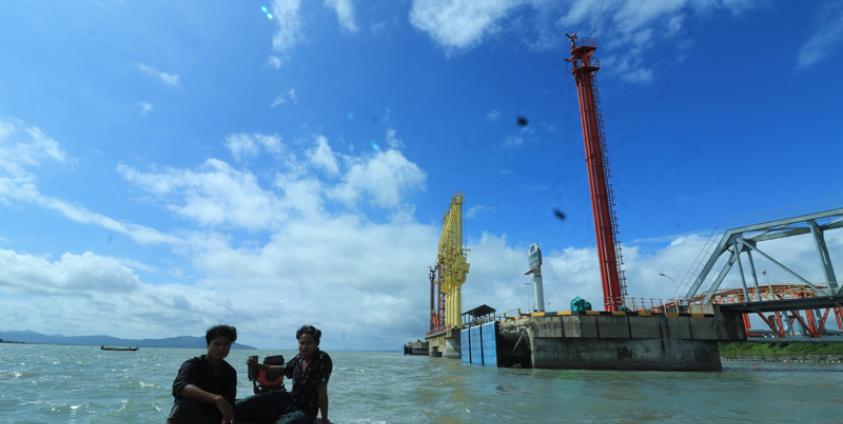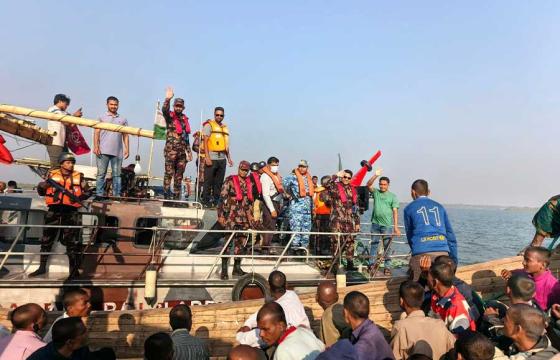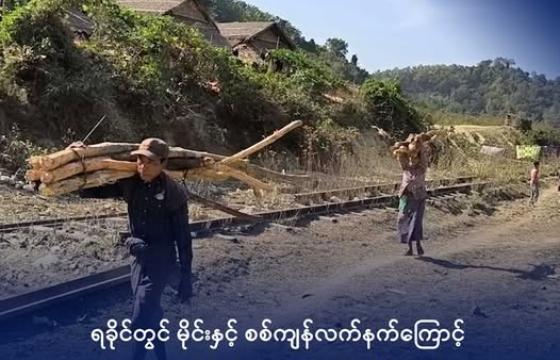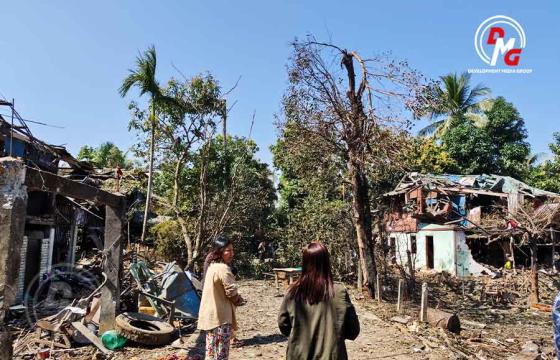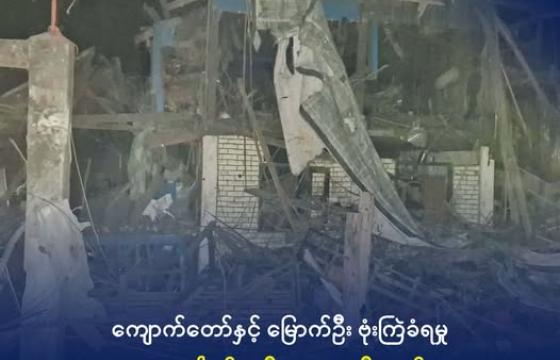Nyo Htun and Mrat Swe — “In the past, we could cast nets along the Thanzit River. This river has abundant fish. We could freely fish before. But we can’t fish in certain places now because we have to make way for vessels due to the special economic zone (SEZ) project,” said fisherman Ko Maung Maung Than.
There are growing concerns as the delayed Kyaukphyu SEZ project initiated under former President U Thein Sein’s government is taking shape under Myanmar’s military regime.
A total of 1735.83 hectares (4289.33 acres) were earmarked for the Kyaukphyu SEZ, with both farmlands and fisheries of locals being absorbed into the project area. Residents including Ko Maung Maung, who has made a living by fishing since he was old enough to work, fear that their livelihoods will be taken away.
“I’m afraid we won’t have a fishery, where we can fish daily to survive, when the project is complete. And we are also concerned that the quay we are using now might be lost,” he said.
The deep-sea port, one of three projects that make up the Kyaukphyu SEZ, impacts waters that include fisheries and lush mangrove forests, as well as fertile farmland on shore.
The US$7.3 billion Kyaukphyu SEZ project will be implemented in a joint venture led by China International Trust and Investment Corporation (CITIC). The framework of the agreement was signed in November 2018, with the Chinese side taking a 70 percent stake, and Myanmar, a 30 percent stake.
The environmental and social impact assessment for the deep-sea port project is underway and is scheduled to be completed in July.
Beijing considers the Kyaukphyu SEZ and the deep-sea port to be crucial to its Belt and Road Initiative, as they will provide China with direct access to the Indian Ocean, allowing Chinese trade to bypass the congested Strait of Malacca near Singapore, while boosting development in its landlocked Yunnan Province, which borders Myanmar.
The deep-sea port project consists of one terminal each on Maday and Ramree islands, totaling 10 berths where oceangoing ships can dock. A total of 370 acres of land is earmarked for the terminal in Maday, and 237 acres in Ramree. Construction is expected to take 20 years from start to completion.
While the project is touted as a booster for China-Myanmar cooperation as well as the economy of the local population, Maday islanders who have suffered from previous projects have no faith in it.
At present, locals report low catches as fishing has been banned in large swaths of waters around the project area, and fishing stocks are said to be declining and their populations imperiled due to industrial waste dumped by companies involved in the project.
“Fish stocks are declining,” said one Maday islander. “And since it started its operations, China National Petroleum Corporation has dumped waste from mountains that they blew up into the Thanzit River where we fish. And there are also buoys in waterways. So, we can now set up gillnets for only a few hours in places where we once could cast for the whole day. So, it has become increasingly difficult for us to fish.”
Maday Island resident Ko Wai Yan went to China to work when it became increasingly difficult for him to continue to make a living as a fisherman after Chinese companies commenced operations in Kyaukphyu. When he returned to Kyaukphyu in 2019, he had no job prospects and tried his luck once again doing what he knew best — fishing.
“The situation was worse after I came back from China. We can’t fish freely. In our area, all of us make a living by fishing. And we suffer a lot of hardship since we can’t fish freely,” said Ko Wai Yan.
Local fishermen organised a campaign against the Kyaukphyu deep-sea port project on October 27. The campaign was conducted in the Thanzit River near Maday Island, where the deep-sea port is slated to be built. In the mangrove forests along the river, they hung vinyl sheets demanding that local fishermen be respected, and that development of the deep-sea port project be halted immediately as it was initiated without the consensus of local residents and had not addressed the grievances of local fishermen and residents
“When the oil pipeline projects started operation in 2017, oil tankers from the Middle East docked at the port on Maday Island, creating inconveniences for local fishermen,” Ko Wai Yan said. “We set up gillnets and when the time came for us to haul back the nets, we couldn’t, because their ships were crossing there. That’s when locals started to feel that this project was causing troubles for them.”
Fishermen have lost not only their fisheries but also their fishing nets.
“They erected sea barriers in 2017. Previously, we could set up gillnets along the Thanzit River, and there were abundant fish stocks in the river. Our fishing nets often got entangled in the No. 40 barrier, and we could not pull them back. We have suffered losses because of No. 40 barrier,” Ko Wai Yan said.
Local fishermen have asked the Myanmar Oil and Gas Enterprise and Fisheries Department to move the No. 40 barrier to another location, but there has been no response, he added.
“Since fishermen can hardly catch fish now, they are struggling even harder to make ends meet,” said U Maung Myint, who runs a brokerage at Maday Island and buys fish and prawns from local fishermen.
“Fish stocks have declined over the past few years, since oil tankers started to come to our areas,” he said. “It appears the overall catch has declined by some 90 percent. Previously, around 20 to 30 viss of lobsters were sold to me a day. Now, I can hardly buy 20 viss in four days.”
The number of people quitting the fishing industry and leaving for foreign countries to seek better jobs is increasing due to the inconveniences associated with catching fish, the lack of good prices for fish, and rising commodity prices.
Much of the debate over the Kyaukphyu SEZ centres on its job-creating potential — and the question of who gets those jobs.
The CITIC consortium will successfully build the Kyaukphyu deep-sea port project for the benefit of the people of Myanmar and the development of Myanmar’s economy, with the support of the Myanmar government, said CITIC Group Chairman Mr. Chang Zhenming at the signing of a framework agreement with the Kyaukphyu Special Economic Zone Management Committee in 2018. He added that after the implementation of the Kyaukphyu SEZ project, management positions would be assigned to local residents, and after 10 years of operation, depending on the situation, about 90 percent of management positions would be assigned to local residents.
But according to analysts, even in some countries with larger ports than the Kyaukphyu port will be, only a few hundred people can be employed.
“When cargo ships arrive, cranes and containers will be loaded at the Kyaukphyu deep-sea port. I don’t see any potential for local people to work on this project. Only a few locals will find themselves in a position to work at the Kyaukphyu deep-sea port,” said one analyst.
U Kyaw Kyaw Soe, a member of the Land Survey and Agricultural Land Utilization Committee assigned by the Kyaukphyu Special Economic Zone Management Committee, said that since the deep-sea port project mostly relies on modern technology, it will not be easy for local residents to be gainfully employed.
“However, the construction of a deep-sea port does not end with the construction of a single port. If the deep-sea port is developed, railways and highways that connect with the port will be built, so the locals will have many job opportunities,” he added. “The construction of the industrial zone will provide many employment opportunities to local and regional residents.”
During project implementation, local residents say they want to be employed not only for basic labour positions, but also for management and other specialty areas, and they worry that unemployment will return after construction of the port and SEZ is completed.


